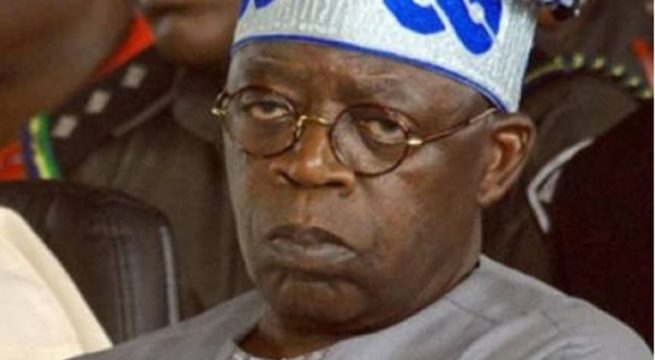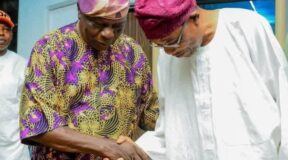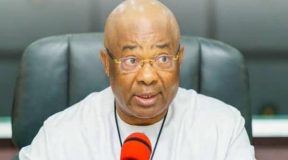How Femi Gbajabiamila allegedly failed Tinubu
OpenLife Nigeria has gathered that Bola Ahmed Tinubu, the national leader of the ruling All Progressives Congress, APC, and visible aspirant in the 2023 presidential contest, had other reasons for jetting out of the country last week.
Credible sources informed OpenLife Monday morning that some of the tactical operatives stationed in some strategic curves on the 2023 presidential highway may have disappointed to deliver on their briefs.
The disappointing realities, among other things, were the reasons he flew out of the countries to remap his political compass ahead of the February convention and APC presidential primaries.
According to the narratives, the Speaker, House of Representatives, Honourable Femi Gbajabiamila was said to have been the arrow head of the syndicate that orchestrated the 2021 Electoral Act Amendment bill which recommended direct primaries in the conduct of political parties’ primary elections.
The Speaker, who has enjoyed the political benevolence of Asiwaju Bola Ahmed Tinubu in his political trajectory, culminating into being the 4th citizen of the country as Reps Speaker, successfully got the supports he needed for the direct primary to scale through in the House.
According to information, Tinubu’s presidential interest was principally the reason for the recommended direct primary.
The reckoning was that should the Villa and controllers of APC machinery decided against his presidency, there is financial war chest to get ordinary party members to vote at the direct primary contest and garner the required votes to become candidate.
Incidentally, the Presidency and key members of President Buhari’s caucus saw the game plan and prevented the President from signing the bill.
President Muhammadu Buhari declined assent to the 2021 Electoral Act Amendment bill, stating that signing it into law would cause trouble among the political parties in the country.
The letter of rejection of the bill by President Buhari was sent to the Senate President, Senator Ahmad Lawan.
Beyond the real reason Buhari declined his assent, he stated that the parties have their various constitutions that indicate that primaries should be conducted either directly or indirectly and until such provisions are amended, asking parties to pick candidates through direct primaries would mean forcing the parties to conduct primaries through direct means which according to President Buhari, amounts to abuse of the constitutions of the parties.
President Buhari further stated that the reasons for his decline include high cost of monitoring the primaries of various parties across the country; marginalisation of small parties; possible litigation; security challenges of monitoring direct primaries, violation of rights of citizens; and possible manipulation of the primaries.
Sensing failure, Gbajabiamila was said to have spoken to the Senate President, Senator Ahmad Lawan, on the need to meet the President to persuade him on the merits of the direct primary project.
Senator Lawan, who is believed to have benefitted from Tinubu’s financial supports during the contest for the Senate Presidency early 2019 bought into the arrangement.
Insiders confided in OpenLife that Gbajabiamila had prepared very well to use his persuasive prowess to argue the case in the meeting with the President.
However, it was a futile effort as President Buhari stood his ground when the two presiding National Assembly officers met him in the Villa.
By the time the bill returned to the President for assent, the scope of primaries has been expanded to include, direct, indirect and consensus, thereby widening the choice for political party managers.
That was the first failure which did not escape Tinubu’s political periscope.
“Tinubu knows very well that he cannot win the primary election through indirect method because most of the delegates are federal government appointees. That was the reason Gbajabiamila did all his best to get the direct method to scale through in the House. The strategy was that since Buhari does not have control over ordinary members of the party, Tinubu can cash in on that window and use cash to buy over as many members that can give him victory votes. Of course, everyone knows that and nobody can match Tinubu when it comes to buying ordinary party members over with money.
“Lawan also supported it because he is also Tinubu’s boy,” OpenLife source stated.
Incidentally, as Tinubu jets out of the country to fashion new strategies and hold meetings with experience election experts drawn from advanced democracies in America and European Continents, his biggest opponent, Vice President Yemi Osinbajo, who has obviously split the South West APC political family through his ambition, has been consolidating his grip on critical voters at home.
In Edo State, deputy governor Philip Shuaibu, in the opposition Peoples Democratic Party, PDP, has assured Osinbajo of 100 percent support during election.
He made the assurance known at the Palace of the Otaru of Auchi where Minister of State, Budget and National Planning, Clem Agba, took a chieftaincy title.
Before then, Ekiti State governor, Kayode Fayemi, had floored Tinubu in the State’s governorship primaries.
Credible informants hinted OpenLife that Tinubu had deployed his political tentacles to shore up supports for Senator Opeyemi Bamidele, to emerge as the party’s candidate in the election.
But governor Fayemi who is believed to have interest in the 2023 presidency under APC, knew that it was time to cut Tinubu to size and reduce his influence in the State.
The defeat of Tinubu’s interest in the primary is the needed signal that his presidential interest may not fly high in a place like Ekiti where Fayemi has re enacted his controlling command.
As Tinubu stays more days overseas, strategizing and attending to other personal matters, analysts aver that it would be a field day for his opponents who are entrenching in the trenches to unleash deadly assault on his ambition in the months ahead.







